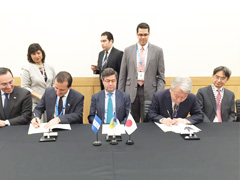On March 26, the Japan International Cooperation Agency (JICA) signed an ODA loan agreement with the Government of the Republic of Honduras on the occasion of the IDB - IIC Annual Meetings 2015 held in Busan, Republic of Korea, to provide up to 16 billion yen for the Cañaveral and Río Lindo Hydropower Strengthening Project. This is the first ODA loan to the Republic of Honduras since the last ODA loan was provided 25 years ago in 1990.
This project is cofinanced with the Inter-American Development Bank (IDB) under the “Cofinancing for Renewable Energy and Energy Efficiency (CORE)1”, which is a cofinancing mechanism created between JICA and IDB aiming at contributing to the mitigation of the negative effects of climate change. The cofinancing loan agreement between the IDB and the Republic of Honduras was signed together in the same ceremony.

Wilfredo Rafael Cerrato Rodríguez, minister of Finance, second from left, Luis Alberto Moreno, president, IDB, center, and Akihiko Tanaka, president, JICA, second from right, at the signing ceremony.
The electricity demand rate in Honduras has increased by average of 2.5 percent from 2009 to 2013, reflecting economic growth of recent years, and power generation capacity is weaker than needed. The current Cañaveral and Río Lindo Hydroelectric Power Plants have the maximum output of 29 megawatts and 80 megawatts respectively, which are the third and second largest installed capacity in Honduras respectively, collectively occupying approximately 35 percent of the total national hydropower generation. In addition, both plants are connected to the Central American Electrical Interconnection System (SIEPAC)2 and are considered as base load power plants of the Central American region, as well. Both plants, however, were one of the first hydroelectric power plants of the country constructed in 1964 and 1974 respectively, and they have not been repaired or reinforced after their major maintenance undertaken in 1993. Current natural wear and fatigue due to age deterioration are detected in many of the equipment, and obtaining spare parts for a lot of equipment are becoming more difficult year by year, till both plants have reached the moment for renewal. Preventing long-term outage of both plants that play important roles economically, as stable and renewable power sources is a priority for the country, and thus, urgent rehabilitation of both plants are needed.
The objective of this project is to contribute to the sustainable economic development through improved stableness of electricity supply, and the mitigation of the negative effects of climate change through ensuring and strengthening the electric generation capacity through renewable sources, by rehabilitating and empowering the facilities of the existing Cañaveral and Río Lindo Hydroelectric Power Plants, located in the northwestern part of the Republic of Honduras. The proceeds of the loan are allocated to expenditures of procurement of equipment for rehabilitation of power generation facilities, civil works, consulting services (support for basic design, tendering assistance and support for implementation), etc.
JICA will continue supporting countries of Central America and the Caribbean, including Honduras, which are vulnerable to natural disasters related with climate change through Japanese ODA loans, in collaboration with the IDB, etc.
(Reference)
| Project title | Amount (million yen) |
Annual interest rate (%) | Repayment period (years) |
Grace period (years) |
Procurement | |
|---|---|---|---|---|---|---|
| Project | Consulting services | |||||
| Cañaveral and Río Lindo Hydropower Strengthening Project | 16,000 | 0.3 | 0.01 | 40 | 10 | General untied |
Preferential Terms for Problems and Issues on Global Environmental and Climate Change are applied.
2. Executing Agency
Empresa Nacional de Energía Eléctrica
Address: Edificio Corporativo ENEE, Trapiche 11, Residencial Trapiche,
Tegucigalpa M.D.C, Honduras, C.A.
TEL / FAX:+504-2235-2904
3. Planned Implementation Schedule
(1) Completion of project: August 2021 - when the facilities are put into service
(2) Issuing of letters of invitation for consulting services (support for basic design, tendering assistance and support for implementation):May 2015
(3) Tender announcement of initial procurement package for international competitive bidding on project construction:
Procurement package title:Respective Main Equipment for Cañaveral and Río Lindo Hydropower Plants
Release date:December 2015
Notes:
- 1 . Since March 2013, CORE (Cofinancing for Renewable Energy and Energy Efficiency) had been to provide Japanese ODA Loan for cofinancing with the IDB to support renewable energy and energy efficiency for the mitigation of climate change to the IDB member countries categorized as from lower-middle-income to upper-middle-income countries in Central America and the Caribbean with the maximum amount of 300 million dollars. In March 2014, the target amount of cofinancing was increased to 1 billion dollars and the eligible beneficiaries were expanded to non-member countries of the IDB, Caribbean Development Bank and uppermost-middle-income countries.
- 2 . Initiative to interchange the electric power in Regional Electric Market through power grid system which connects 6 countries in Central America (Panama, Costa Rica, Honduras, Nicaragua, El Salvador, Guatemala)




scroll